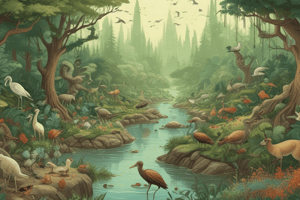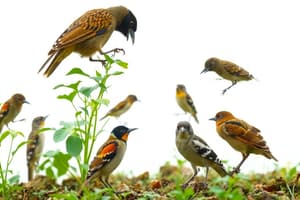Podcast
Questions and Answers
What does biodiversity refer to?
What does biodiversity refer to?
- The variety of life found on Earth (correct)
- The exchange of materials and energy in an ecosystem
- The interactions between different species within an ecosystem
- The birth and death rates of a population
Which factor can contribute to the collapse of ecosystems under pressure?
Which factor can contribute to the collapse of ecosystems under pressure?
- Improved disease resistance
- High population density
- Low biodiversity (correct)
- Increased immigration
What is an ecosystem characterized by?
What is an ecosystem characterized by?
- Its distinct set of organisms and processes (correct)
- The human activities that occur in it
- The number of natural disasters it has experienced
- The variety of climates within it
How can understanding population dynamics help in ecology?
How can understanding population dynamics help in ecology?
What does an ecological niche represent?
What does an ecological niche represent?
How does high biodiversity contribute to ecosystems?
How does high biodiversity contribute to ecosystems?
Which of the following best describes commensalism?
Which of the following best describes commensalism?
What is the primary factor that determines an organism's ecological niche?
What is the primary factor that determines an organism's ecological niche?
Which of the following is NOT a factor that can lead to changes in population dynamics?
Which of the following is NOT a factor that can lead to changes in population dynamics?
Which of the following types of community interactions involves one species feeding on another?
Which of the following types of community interactions involves one species feeding on another?
What is the term used to describe the diversity of species within an ecosystem?
What is the term used to describe the diversity of species within an ecosystem?
In which type of community interaction do both species benefit from the relationship?
In which type of community interaction do both species benefit from the relationship?
Flashcards are hidden until you start studying
Study Notes
Ecology
Ecology is the branch of biology concerned with the relationship between organisms and their environment. It encompasses various aspects of life, including community interactions, ecological niches, population dynamics, and ecosystems, all of which contribute to biodiversity.
Community Interactions
Community interactions refer to the relationships among different species within a given habitat. These relationships can be categorized into four types: predator-prey, competition, commensalism, and mutualism. Predators feed on prey species, while prey species evolve mechanisms to avoid or defend against their predators. Competition occurs when two species struggle for the same resources. Commensalism involves one species benefiting from another without affecting it negatively, while mutualism benefits both species involved.
Ecological Niches
An ecological niche refers to the role an organism plays within its ecosystem, often determined by its physical and behavioral traits that help it survive in specific ecological conditions. Each species occupies a unique niche within its ecosystem, and changes in populations, habitats, or environmental factors can lead to shifts in niches. This concept of ecological niches explains why different species coexist within the same habitat without direct competition.
Population Dynamics
Population dynamics refer to changes in population size and distribution over time. These changes can be influenced by various factors, including environmental conditions, birth and death rates, immigration and emigration of individuals from other areas, disease outbreaks, and natural disasters. Understanding population dynamics helps us predict future trends in a species' abundance and potential interactions with other species.
Ecosystems
An ecosystem is a community of living organisms interacting with each other and their physical environment, exchanging materials and energy. It includes both biotic components like plants, animals, and microorganisms and abiotic components such as temperature, sunlight, water, and soil. Each ecosystem is characterized by its distinct set of organisms and processes, leading to diverse patterns of ecological relationships.
Biodiversity
Biodiversity refers to the variety of life found on Earth. It includes genetic diversity within species, the diversity of species within ecosystems, and the diversity of ecosystems themselves. High biodiversity contributes to resilient ecosystems that can adapt to changing environments and recover from disturbances such as natural disasters or human activities. Conversely, low biodiversity can result in less stable ecosystems prone to collapse under pressure.
In conclusion, ecology is a complex field encompassing many interconnected concepts like community interactions, ecological niches, population dynamics, ecosystems, and biodiversity. Understanding these elements helps us appreciate the intricate web of life and our role in maintaining healthy ecosystems.
Studying That Suits You
Use AI to generate personalized quizzes and flashcards to suit your learning preferences.




